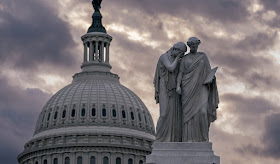The sheer madness that has gripped many elite universities since October 7 and the butchery, rape, torture, and mutilation of some 1,000 Israeli civilians by Hamas murderers have shocked the public at large.
Campus craziness is, of course, nothing new. But quite novel for campuses was the sudden jettisoning of prior campus pretenses. Universities have brazenly dropped their careful two-faced gymnastics to reveal at last–unapologetically, proudly, and defiantly–the moral decay that now characterizes American higher education.
Recent news stories have exposed this rot to the world, and will have grave repercussions for higher education in the next few years.
The Nazis once desecrated the tombstones of dead Jews. Our campuses have updated that hatred. Students now tear down pictures of Jewish captives kidnapped or murdered by Hamas. University presidents do not condemn the hate-filled rallies supporting the killing of Jews in Israel, even though, according to their own safety-first ideology and prior proclamations about systemic hatred, these rallies instill a “climate of fear” in some students.
An instructor at Stanford separated Jewish students from their belongings, ordered them to stand in the corner, boasted about denying the Holocaust, and singled them out for unhinged rantings. Screaming campus activists and professors openly support Hamas even after its brutal killing of hundreds of Israeli women, children, and infants. That for more than two weeks thousands of rockets—barrages initially designed to enhance the surprise mass murdering of October 7—daily continue to shower down upon Israeli cities is of zero concern to loud campus activists.
An even bolder Cornell history faculty member bragged that he was “exhilarated” on news that Jews were butchered on October 7. A UC Davis professor threatened to go after the children of “Zionist journalists.” “Savages”, “excrement” and “pigs” are the adjective and nouns one professor at the Art Institute of Chicago posted to describe Israelis.
At rallies and protests, hundreds shout about eliminating Israel altogether; students, faculty, and throngs in general occasionally wear masks or wrap their faces in keffiyehs, as if conceding that most would find anyone identifiably mouthing such advocacy despicable. In some sense, such campus haters have become the equivalent of anti-Semitic sheet-wearing Klansmen.
There was plenty of prior evidence to predict the hate-filled, bigoted, campus reaction to the mass murder of hundreds of Jews inside Israel. The ideology of “decolonization” that today condemns Israel, and the West generally, has had many equally rancid predecessors.
Racially segregated housing reappeared years ago as “theme houses.” Effectively segregated, no-go areas are euphemistically known as “multi-cultural rooms.” Any critics who have objected to such institutionalized racism, in Orwellian fashion, have been smeared as racists.
Events that are off-limits to particular races on campus—like separate but equal graduation ceremonies or campus activities—are heralded as “celebrating diversity.”
Joseph-McCarthy-era “loyalty oaths” have returned to campus under the woke veneer of “Diversity, Equity, and Inclusion Statements.” Refuse to issue such a personal manifesto—and one will suffer career consequences.
Unpopular or unwelcome questioning of left-wing university orthodoxy is libeled as “hate speech.” Dissenting views are officially censored, slandered and suppressed as “misinformation” and “disinformation.”
Face unproven allegations of “inappropriate behavior” and one can expect to lose one’s 4th, 5th, and 6th Amendment rights in any star-chamber university inquiry.
Admissions to universities, along with faculty hiring, retention, and tenure, are predicated on racial preferences and de facto quotas.
Even before the Supreme Court struck down affirmative action, universities had already galvanized to implement ways to ignore its anticipated ruling—in good Confederate nullification style.
The old notion of “disparate impact” and “proportional representation” that set hiring and admission quota on the basis of racial demographics have given way to a sort of “reparatory” admissions—in which whites, regardless of grades and test scores, are collectively to be admitted and hired in far smaller numbers than found in the general population, and certain non-white groups, particularly East and South Asians, are actively discriminated against.
The old Enlightenment notion of not stereotyping entire groups as a faceless collective, and instead seeing persons as diverse and unique individuals, has given way to sloppy sloganeering like “white privilege,” “white supremacy” and “white rage.” Campuses apparently believe that a working class mechanic in Fresno County or a minimum wage tractor driver in Dayton, Ohio enjoys more power and privilege than Oprah Winfrey or Ibrahim Kendi.
For the last few decades, the public has been willing to put up with all this madness in higher education—even as political correctness squashed free speech on campus and affirmative action descended into woke racial essentialism.
Why?
One: universities assured America that their preeminent math, science, technology, and engineering departments—along with their professional medical and business schools—remained largely apolitical, research-orientated, and meritocratic.
Those departmental commitments to excellence without political interference had in the past always ensured American dominance in global research and development.
Two: the bachelor’s degree was once acknowledged as solid proof of a general education.
Graduation from college once supposedly certified that a citizen entered the work force with historical literacy, as well as enriched by philosophy, literature, and art.
Graduates also then purportedly understood our Constitution and civic life. They were assumed to have basic computational skills, as well as being versed in inductive reasoning and in analytical reading, writing, and speaking ability.
In other words, millions of college graduates were to share common skill sets— and that reality would help to ensure a complex and moral American democracy.
Unfortunately, neither of these two arguments for widespread college enrollment is any longer true. It is unnecessary to rehearse the sad decline of the humanities and the associated general civic education courses at today’s universities. Everyone is by now familiar with the multitude of “grievance studies” courses, therapeutic studies classes, and social activist degrees that have largely replaced conventional history and literature programs. Tragically, the rot has also spread to the sciences.
During the COVID-19 pandemic, there was systemic, campus-led censorship of dissenting scientific views, witch hunts of distinguished health care professionals, and de facto suppression of open scientific debate over the safety and efficacy of vaccines and the cost-benefit value of the lockdowns.
Medical-school doctors were demonized if they argued that there was scientific support for augmenting COVID-19 treatment with existing cheap, off-label pharmaceuticals, and even vitamin and supplement regimens. Authors of scientifically-based arguments that the origins of the COVID-19 virus was to be found at the Wuhan virology lab in China were demonized and their conclusions smeared rather than refuted.
In addition, any university-related scientific dialogue over the degree of and remedy for man-made, fossil-fuel-induced climate change must adhere to strict orthodoxies. Any apostates will risk having their careers curtailed and endangered.
It is also perilous for researchers, doctors, and public-health experts on campuses to question the recent dogma that sex is entirely socially constructed rather than biologically determined.
The university-trained computer minds that fuel Silicon Valley’s high tech industry have weaponized their Internet search results to prioritize links deemed socially and politically preferable.
University graduates are also past masters at Internet shadow-banning, doxxing, blacklisting, and canceling any person, institution, or idea that is felt to be detrimental to or at odds with the progressive agenda.
As for business, law, and medical schools–they now transfer much of their finite resources away from honing professional skills to ideological indoctrination in supposed diversity, equity, and inclusion.
As a result, universities have lost their century-long credibility as guardians of free and open scientific inquiry. Any contemporary university scientist who followed a renegade devotion to disinterested science–as embodied by Democritus, Galileo, or Copernicus–would encounter the same premodern character assassination, groupthink opposition, and efforts to destroy his career.
In sum, if exorbitantly priced higher education can no longer produce either a class of broadly educated citizens, or an empirically-trained and elite scientific, professional, and technological class, then why would Americans any longer put up with universities’ unapologetic indoctrination—a sort of interference with the university’s mission so reminiscent of the disastrous Russian commissar system that had nearly destroyed the Red Army at the outset of World War II?
Reform will only come through curtailing the government handouts that fuel multibillion dollar university endowments. Such unprecedented affluence ensures lavish campus budgets that in turn subsidize racist, anti-Semitic, and McCarthyite policies and institutions.
Just tax the income from the roughly $1 trillion of America’s tax exempt university endowments and perhaps there would not be quite enough money for courses on cartoons, cross-dressing, and BLM, much less for thousands of DEI commissars and censors.
Stop federal funds to any university that refuses to ensure Bill-of-Rights protections for its students.
If the SAT and ACT are increasingly dropped for admissions to universities, then an exit version of them should be required to ensure that all BA and BS degrees certify at least a minimum competence in math, science, and general knowledge.
Get the government out of the $1.8 trillion student loan business—and perhaps campuses would understand the concept of moral hazard. Only then would they monitor carefully extraneous expenditures and begin graduating students in four years—with the skills that employers so desperately need and the knowledge that a democracy relies upon.
If thousands of big donors who give billions of dollars to Ivy League and other tony universities were to “just say no,” then perhaps grasping deans, provosts, and presidents would begin to wonder whether they could fund any more rock climbing walls, latte bars, DEI czars, drag shows—and hate-Israel courses and student organizations.
In short, colleges are now a bad deal—far too costly, too political, and too incompetent in fulfilling their mission to the country. They no longer can deliver on what they were created for, and they simply will not stop fueling things that are not just unnecessary, but downright injurious to the country, scary, and destructive.
Who wishes to continue with all that?












